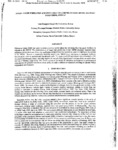| dc.description.abstract | Following Ozaki (2009) the paper examines positive social values for switching from inorganic fertilizers to* tithonia in the NRDB. The predominance of sugar cane production in the NRDB generates immense water 3 pollutants (mainly because of massive application of fertilizers) that undermine water availability to households. i, in the NRDB. Tithonia, a commonly available weed in the NRDB is an alternative to inorganic fertilizers because of it is rich in nutrients and can detoxify soils. The paper used 416 participants who responded to 101 structured questionnaire items. Two step regression analysis linked participant's characteristics to social values and use of tithonia, respectively. The results indicated that levels of education, participation in environmental organization and personal conviction about ability to make a difference enhanced switching to tithonia. Policy implications are discussed | en_US |

